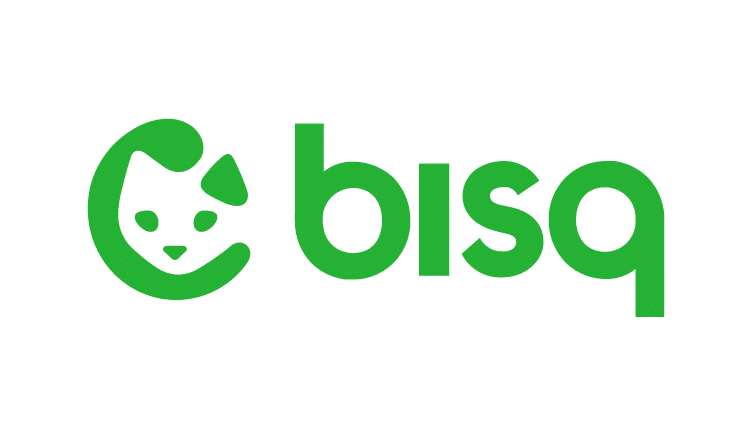Bisq is about as far from a traditional brokerage account as you're likely to get. It's a decentralized exchange, which brings its own set of benefits and disadvantages. While it's more secure, you'll have to work harder to buy or sell crypto. Read our full Bisq review to find out if it's right for you.

Bottom Line
Decentralization offers certain security advantages for some users. But the vast majority of cryptocurrency investors will find it difficult to implement a trade. We recognize the security advantages. Our lower rating reflects its fit for the majority of the market.
Fees:
Pay in Bitcoin or BSQ cryptocurrency, fees vary by option (see fees section for more)
Account Minimum:
Limited to 0.01 bitcoin until verified by a trusted peer user
Alternatives to consider
Full Bisq review
This cryptocurrency exchange is a good fit for: Crypto traditionalists who believe in the ideology of decentralization. Bisq is not a fit for most other cryptocurrency investors.
Pros
- Decentralized exchange
- No geo restrictions
- You're in control
- Security
Cons
- Decentralization isn't for everyone
- Application is somewhat basic
- Potential for fraud
- No credit card payments
What is a decentralized exchange?
Bisq is one of the better-known decentralized exchanges. Before we get into the nitty gritty of Bisq, it's worth understanding the difference between a centralized exchange (CEX) and a decentralized exchange (DEX).
Decentralized exchanges use peer-to-peer networks to facilitate trading. Think of it like Craigslist -- it's a platform that connects buyers and sellers. If you're using cryptocurrency to diversify your stock portfolio, you may be more used to working with a brokerage that sits in the middle of your trades. A decentralized exchange connects you directly. There's no middleman.
If you are considering using a decentralized exchange, be aware you may still owe tax on any crypto gains. Regulatory changes could also have a big impact on decentralized platforms, particularly if regulators try to enforce stronger know-your-customer (KYC) requirements.
Top perks
Decentralized exchange
Depending on your outlook, this could be both a pro and a con. Bisq is not just a decentralized exchange -- it's an exchange that's dedicated to decentralization. People who like the Bisq exchange like its ideology of decentralized governance, which is also key to cryptocurrency in general. The benefits are:
- Increased privacy and anonymity
- You keep control of your crypto
- It's open to unbanked users
And, a bit like a credit union, Bisq is owned and run by its traders and contributors. Its founding principles are user privacy, user security, and censorship resistance. What that means is that you control your information and third parties can't see what you are doing with your funds.
Instant approval and no geo restrictions
Unlike centralized cryptocurrency exchanges, Bisq does not ask for any private information when you register. You won't have to wait while it validates your photo ID, and there won't be any glitches when you try to fund your account. You'll pay the seller directly so the money can't get stuck in the system. That said, there are restrictions on the amount of trading you can do, particularly at the start.
The other benefit to Bisq's system is that anyone can trade from anywhere. Other exchanges are limited to certain U.S. states or certain countries. Anyone with access to a computer can trade with Bisq.
You control your crypto
A centralized exchange could freeze your funds for a number of reasons and you wouldn't be able to stop it. Or, as we've seen in recent years, an exchange may fail and your money could get tied up in bankruptcy proceedings. Using a CEX is a bit like depositing your money with a bank -- the bank, or exchange, has your cash. But unlike a bank, FDIC insurance won't cover your crypto deposits. In contrast, you never need to deposit funds into a decentralized exchange like Bisq. You transfer funds directly to the buyer or receive them from the seller.
Security
Like all the best cryptocurrency exchanges, Bisq takes security seriously. Indeed, it has a big advantage over centralized exchanges. Your personal and banking information is stored on your own computer -- it doesn't go to a central point that could be hacked.
TIP
Once you’ve chosen one of our top-rated brokers, you need to make sure you’re buying the right stocks. We think there’s no better place to start than with Stock Advisor, the flagship stock-picking service of our company, The Motley Fool. You’ll get two new stock picks every month, plus 10 starter stocks and best buys now. The average stock pick inside Stock Advisor is up 966% — more than 4x that of the S&P 500! (as of 1/5/2026). Learn more and get started today with a special new member discount.
What could be improved
Many of the advantages of the Bisq exchange can also be seen as disadvantages, depending on your point of view.
Decentralization isn't for everyone
There's a reason the large majority of crypto transactions go through centralized exchanges. They make it easy to trade both fiat currencies and cryptocurrencies. The big centralized exchanges are usually more liquid, so it's easier to buy or sell the coin you want. They are also faster and often offer more customer support.
No bells and whistles
If you're looking for an all-singing, all-dancing website, Bisq won't be for you. Similarly, if you're new to trading and want crypto educational resources, you might need to look elsewhere. This is an open-source desktop application that you install and maintain. Be willing to spend time understanding the system and how it works.
You can't trade on your mobile, and your computer needs to be online while an offer is active. Bisq does not match orders automatically. Unlike most centralized exchanges or brokers, you'll have to search for the trade you want. Finally, you can't stake currencies to earn interest as you might on a CEX.
You are in charge of security
There are pros and cons to being your own exchange. You hold the keys, so there are consequences if you lose them. Seriously. If you forget your security information, you could lose access to your wallet and the crypto that's in it. You also need to back up your Bisq data regularly and keep your antivirus software up to date.
No credit card payments
Bisq has several payment options, but you can't use a credit card to buy crypto and it does not support PayPal, Venmo, or Cash App. Whatever route you choose, bear in mind that it will take time. Unlike the instant trading offered by a centralized exchange, it could take days for a bank to process a cash deposit or money order.
You need Bitcoin
Before you can do anything on Bisq, you'll need Bitcoin in your account to cover fees and the security deposit. This can be a chicken-and-egg scenario, especially if you don't want to use a centralized exchange. Bisq suggests using a Bitcoin ATM, or buying from a friend to get started. On the topic of Bitcoin, all Bisq transactions go through Bitcoin. So if you want to swap U.S. dollars for Ethereum (ETH), you'd have to first use the dollars to buy Bitcoin and then use that Bitcoin to buy Ethereum.
Potential for fraud
You may be better protected against hacking and identity theft, but you're still at risk of fraud. According to De.Fi, almost $2 billion was lost to DeFi fraud in 2023. The concern is that since you don't have to prove your identity and buyers/sellers make payments directly, criminals could exploit the system. For example, someone might reverse the payment after the exchange has been made. However, Bisq's support pages say the majority of trades go smoothly thanks to built-in protections. These include a system of security deposits and a mechanism to resolve disputes. There is also a risk that people use the anonymous nature of the platform to launder money from illicit activities.
How Bisq works
Bisq is a desktop application that you need to install and run on your computer. This is not a quick and easy way to buy Bitcoin. It's aimed at people who want to trade anonymously and are willing to make the extra effort to do so. Bisq gives detailed instructions on how to use the service, but there's still a lot to get to grips with.
It's worth noting that Bisq isn't a company, it's a piece of software. Unlike a centralized exchange, you don't need to deposit money onto the Bisq platform. Instead, you fund and pay fees through your Bisq wallet, which is a non-custodial crypto wallet that you control. You then make or receive the payment directly, depending on whether you're buying or selling. You can't trade using a mobile app (though you can download Bisq's mobile app to monitor your trades).
You don't have to provide any private information. Most centralized exchanges will ask you to provide your name, address, a photo ID, and proof of residence. To use Bisq, you'll need to install the software, set up a payment method, and find someone who wants to trade with you.
Buying or selling on Bisq
Here's how to make your first trade on Bisq:
- Download the app to your desktop. It sets up a peer-to-peer network that allows users to directly exchange cryptocurrencies.
- Set up your security. You are the only one with access to your Bisq account; there isn't a handy "forgot password" button. You'll need to encrypt your wallet and set up your backup location.
- Set up a payment method. There are a number of ways to pay, including depositing cash at a bank or using the Zelle payment app. You'll also need Bitcoin in your Bisq account to cover the deposit and fees.
- Make a trade. You can either make an offer and wait for someone to accept it, or take an existing offer.
- Transfer your money. Each step is tracked and supported on the Bisq platform. When the seller receives your payment, they transfer the coin. If all goes well, you will both get your security deposit back.
The idea of transferring your money to a stranger on the internet may sound scary. And you'd be right to be cautious. But there are protections, such as the security deposit and Bisq's dispute resolution process. In addition to the money from the buyer and seller, the system puts in an additional arbitrator deposit. Moreover, there are not many customer complaints, which suggests it works.
Fees overview
There are five costs to consider when you trade on Bisq:
- Trading fee. This goes toward the development of Bisq software.
- Mining fee. This is the fee you pay to process your transaction on the blockchain. Fees are paid in BTC and depend on several factors, such as how busy the network is.
- Spread. This is the difference between the market price and the price you buy and sell for.
- Returnable security deposit. When someone makes an offer on Bisq, they set a security deposit of 15% to 50% of the trade. This is locked up and released at the end of the trade, assuming all goes well.
- Your own bank transfer charges. Find out whether your bank will charge you to transfer or receive money.
In terms of the trading fee, you can opt to pay in Bitcoin (BTC) or Bisq's native coin, BSQ. According to Bisq, the combined trading fee is 1.3% (see maker/taker table below). The BSQ trading fee is about half this at around 0.65%. Since the values of both coins fluctuate, fees change periodically.
Trading fees per 1 BTC
| Fees | BTC | BSQ |
|---|---|---|
| Maker | 0.0015 | 18.57 |
| Taker | 0.0115 | 142.38 |
Cryptocurrency selection
The majority of Bisq trades are between traditional currencies and Bitcoin. Bisq only supports a limited number of altcoins and it put an indefinite hold on adding new ones back in 2020. The Bisq markets page shows transactions in major cryptocurrencies such as Ethereum, its native BSQ currency, and privacy coins such as Monero (XMR).
This type of peer-to-peer trading relies heavily on having willing people on both sides of the trade. At time of writing, there were almost 250 offers to buy or sell Bitcoin in U.S. dollars or euros, but only a handful for, say the Swedish krona or Japanese yen. There had only been one Dogecoin (DOGE) transaction in the past week and no trades in Litecoin (LTC). If you're looking to Bisq because you want to access a broad range of smaller cryptocurrencies, you'll likely be disappointed.
Is your cryptocurrency safe with Bisq?
The decentralized nature of Bisq is a key part of its security. None of the information is stored on a central server. That means there's no central point to hack -- so neither your money nor your personal information can be stolen from the main platform. If Bisq collapses, your crypto will not be affected. That said, it's worth noting that Bisq had to shut down temporarily in 2020 when a flawed security patch allowed a hacker to steal a total of $250,000 from seven individuals. Bisq fixed the problem and pledged to compensate the victims.
There's also a different risk: If your computer is hacked or you lose your security information, you could be in trouble. The onus is on you to protect your own system. You'll need good personal security, such as up-to-date anti-virus software and a strong password. And you'll need to keep your seed words somewhere safe (ideally written down offline). Seed words are a series of words you can use to recover your account if something goes wrong. If you lose them, you could lose everything you've invested.
There is also a risk of individual scams. Unfortunately, anonymity can attract fraudsters, scammers, and criminals. Bisq says its security deposit requirements and other protections mean fraud is rare on the platform. This is supported by the comments on its forum. There's also a concern that anonymous platforms could be used to circumvent money laundering laws. One measure Bisq uses to minimize this risk to limit trading amounts, especially on new accounts.
The SEC advises investor caution when it comes to crypto and filed charges against several crypto platforms in 2023. It says that a number of popular cryptocurrencies -- including Solana, Cardano, and Polygon -- are unregistered securities. This could impact the way these and other cryptos are traded in the U.S. Increased regulation could also impact decentralized exchanges like Bisq. As a crypto investor, make sure you understand how the SEC cases and any regulatory changes could impact your portfolio.
Bisq is right for you if:
- You're tech-savvy and willing to run the Bisq software on your computer.
- You don't want to provide your personal information in order to trade and want to join the Bisq community
- You're an experienced crypto investor concerned about the security of centralized exchanges.
FAQs
-
One of the ideas behind Bitcoin and blockchain technology was to cut the middleman -- such as your bank or central government -- out of everyday transactions. If that ideology appeals, a DEX may be for you. Decentralized exchanges let you trade directly with other people in a secure yet anonymous manner. Moreover, you retain complete control of your funds and don't need to worry about what might happen to any assets you deposit on a centralized platform.
-
Decentralized exchanges are often not as user-friendly as their centralized counterparts and can involve a steep learning curve. Plus, some DEXs have lower trading volumes so you might not always find someone willing to buy or sell at the going rate. You may also have to pay gas fees to make transactions directly on the blockchain, which can wind up costing more than centralized platforms.
Motley Fool Stock Disclosures
Discover Financial Services is an advertising partner of Motley Fool Money. Emma Newbery has positions in Bitcoin, Cardano, Ethereum, and Polygon. The Motley Fool has positions in and recommends Best Buy, Bitcoin, Cardano, Ethereum, Maker, PayPal, Polygon, Solana, and Target. The Motley Fool recommends Discover Financial Services and Monero and recommends the following options: short December 2024 $70 calls on PayPal. The Motley Fool has a disclosure policy.Terms Apply. Cryptoassets are highly volatile. Your capital is at risk.

